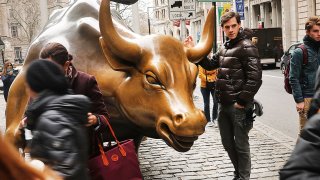
- Netflix corrected by 10% in after hours on Tuesday on weak earnings, and while it's a stock with a history of big earnings volatility, declines in Zoom and Peloton stoked fears that the broader stay-at-home trade has more pain to come.
- Wealthy investors with at least $1 million in a brokerage account are less bullish on stocks, and tech in particular, than they were at the start of 2021, according to a new E-Trade survey.
- The percentage of those going to cash more than doubled quarter-over-quarter, but at 16%, is still a minority and about two thirds (68%) still expect the S&P 500 to end Q2 with a gain.
The decline in Netflix shares after weak subscriber growth sent a chill through the market about a bull run for stay-at-home stocks that may have reached its peak and there is more pain to come in pandemic winners like Zoom and Peloton. More wealthy investors seem to be asking themselves this question — and it's about more than just the pandemic's biggest winners, not to mention answering it by selling stocks and going to cash.
The percentage of investors with $1 million or more in brokerage accounts they self-manage that sold out of market positions and went to cash in the second quarter more than doubled, from 7% to 16%, according to a new survey of wealthy investors from Morgan Stanley's E-Trade Financial shared with CNBC. Overall bullishness declined as well, with millionaire investors who say they are now bearish increasing by 6 percentage points, from 36% to 42%.
Get DFW local news, weather forecasts and entertainment stories to your inbox. Sign up for NBC DFW newsletters.
That may not seem like a major uptick, and the majority (58%) of these investors remain bullish, with more of the wealthy saying they expect Q2 to end with a rise in the S&P 500 Index.
Stocks were higher on Wednesday, even as Netflix's big drop continued, with the Dow Jones Industrial Average up 316 points (about 1%) and gains led by the part of the market most closely tied to the domestic economy reopening, small-cap stocks represented by the Russell 2000, which was 7% off its 52-week high coming into trading and ended the day more than 2% higher.
But the survey details do reveal notable, and increasing, worries about the market, inflation, and Fed policy, as well as a major decline in bullishness on the tech sector, and more appetite to move away from U.S. stocks. In all, the survey suggests that the pockets of bearishness are rising among the wealthy, even if the majority remain patient with a pricey, maybe overextended, U.S. stock market.
Money Report
The E-Trade survey was conducted from April 1 to April 12 among a broad universe of self-directed investors, with the results from 207 investors with $1 million or more of investable assets provided to CNBC exclusively.
Short-term bearishness is back
For Mitch Goldberg, a New York-based investment advisor with ClientFirst Strategy who a year ago was convinced the bottom was in for stocks after the March 23 low and bought based on that conviction, there has been a change in sentiment to short-term bearishness that has led him to lighten up on some stock positions and park money in cash even with interest rates offering little.
"In the very short term, I'm bearish, the next two months or so," he said. "I've been raising some cash, not crazy defensive, I just think stocks have gone up a lot and I bought a lot, was very bullish when I had to be. Now it is time to take some off the table."
With bonds not an attractive alternative to stocks, at least not yet, even in a market where fears about inflation are up, "O.1% in cash is fine for now because it's short-term preservation," he said. "I don't think we are going to have a 2001 or a 2008-2009. I still have money in stocks, just a little less," he added, noting that he does not expect the U.S. stock market as a whole to end the year in the red.
After the volatility experienced by stocks in the first quarter — which included double-digit moves down in tech and growth leaders, energy and small-caps before rebounds— there was "a little profit taking," says Mike Loewengart, chief investment officer at E-Trade Capital Management. "Raising cash is consistent with a long-term view. ... as we come off strong performance in 2020 and in Q1, taking profits is totally in line," he said. "Over time we know that we see the market generally does move up, but in a small time period, volatility can be painful."
While many investors and market prognosticators remain concerned about a bigger pullback before the year is done, the S&P 500 has averaged a 6% growth rate over the past century and bull markets have a history of lasting for years.
Top S&P 500 sectors see big declines in sentiment
Millionaires in the E-Trade survey are looking more to international markets and real estate as conviction on S&P 500 sector bets drop. Both the information technology sector and health care sector saw 19% declines among wealthy investors when asked to rate the sectors with the most potential currently. Both had previously been the top picks of more than half — in the case of health care, two-thirds — of the wealthy investors in the survey. Meanwhile, interest in real estate as the best bet just about doubled, from 16% to 31%.
"Real estate fits this market," said Lew Altfest of Altfest Personal Wealth Management, whose firm is launching its first private real estate fund this quarter. "The core of what's happening is that people are optimistic and at same time recognize optimism and spending could lead to inflation, and are rightly concerned as that leads to more competition for stocks from bonds as rates move up. Some will get off boat because of inflation," he said.
Fears about inflation as the No. 1 threat to portfolios rose from 5% to 18% in the E-Trade survey, quarter over quarter.
It is not just the stay-at-home trade that ran too far, too fast for some, but the overall market.
The rotation trade away from big tech and the pandemic winners and into the reflation stocks also "got way ahead of itself" in Goldberg's view. The moves higher make sense when factoring in a U.S. economy that pulled a lot of second-half growth expectations into the first half of the year, but because it has been so strong that has led to fears it is fully priced into more stocks, and led Goldberg to not only reduce positions in some growth names but big cyclicals also, while not selling out entirely.
A spillover effect from those biggest winners, whether a tech stock or a consumer staple that boomed, has the investment advisor on the defensive. And having lived and invested through multiple bull and bear markets in the past, Goldberg said when the biggest names in the market like Netflix begin to fail — the stocks in the market's "first tier" — there is more reason to worry about more stocks crumbling, even if the Netflix issues are company-specific and in a stock with a long history of big swings on earnings.
It is not necessarily time for investors to bail on their favorite blue-chips, like a Microsoft, but for investors who experienced previous market corrections to remember that the more speculative names in the market drop first and that leads investors to the bigger, safer stocks, but ultimately, that top tier becomes even pricier and is not immune from a market under pressure.
More cautious millionaire investors
"There's no doubt they are more cautious," said Loewengart. Overall, 68% of the wealthy in the survey say the market will rise this quarter, but 35% of those expect a gain of no more than 5%. "They see room for continued improvement although it will be a little different than what we've seen over the last year," he said. "Fundamentals will matter again."
The millionaire view should be considered in the context of recent performance and the fact that so much has been priced into the reopening trade already, but balanced against the fact that there remains the accommodative backdrop of monetary policy from the Fed and the stimulus plan, and now the prospect of infrastructure spending, which creates "a highly conducive environment for further gains in the market," Loewengart said.
JPMorgan Chase CEO Jamie Dimon recently noted there is $2 trillion in checking accounts that is pent up demand in the consumer economy "coiled" and ready to be spent.
That helps explain the majority expectation of a continued rise in equities, even amid the rising pockets of bearishness. "More people are getting vaccinated and business opening up and really just the economy coming back to life, back to work and more people spending," Loewengart said.
Consumer discretionary saw one of the biggest jumps among sectors with the most potential this quarter in the E-Trade survey, up from 17% to 31% of the wealthy saying it was their top S&P 500 bet.
"There were a handful of very large companies in the tech sector that drive the overall market and now investors are focusing on the consumer and real estate which clearly benefit from reopening," Loewengart said.
The E-Trade survey does find investors bullish on the U.S. economy as a whole, with those grading the U.S. economy at a D or F declining from roughly one-third (34%) last quarter to 17% now and fears about the pandemic as the biggest risk to market portfolios declining significantly. It dropped from being the No. 1 risk in the first quarter to No. 6 overall.
Altfest remains convinced in the U.S. economic outlook as a driver of corporate profits, but says it is difficult for investors to assess whether the growth projections of GDP at 6% or even reaching 10% can be sustained or the economy ends up back in a 2% GDP world, which would make the market a less attractive investment. "If we have a five-year run here then corporate profits can grow very rapidly. And that rapidly can offset a decline in P/Es caused by inflation and still come away with good returns," he said.
And even with the rest of the globe struggling with vaccine rollouts and rising cases, he is a believer in looking at international equities. "Even if the U.S. grows faster and corporate profits grow faster, these are cheap stocks overseas, much cheaper, and I have to believe the vaccine problems will be taken care of, just six months behind us or something."
Indeed, many wealthy remain in a risk-on stance. More taking the survey say their risk tolerance has increased, up from 24% to 30% in Q2, while the quarter-over-quarter reading on millionaires saying their risk tolerance had decreased was flat. Altfest sees investors looking to remain go-go, and looking at alternatives to large-cap stocks, though not always for the right reasons. And that troubles him more than any reasonable reassessment of valuations.
"Some are on edge and looking for new investments. I've never had anyone call about bitcoin or crypto and now I am getting calls about them."
Amid the declining sentiment on S&P 500 leaders, the E-Trade survey found higher levels of interest in cannabis stocks, bitcoin and SPACs in Q2.
Altfest has the same answer every time he gets one of these calls. "It's not something you want to get involved with, that's what I tell them."
He doesn't view the interest as investors looking for an inflation hedge or analyzing the price-to-earnings ratio of stocks as being high, but more simply: "It speaks to greed. ... 'what goes up will continue to go up' is still the philosophy of many people, when it should be the exact opposite."
That "exact opposite" view is one that more are coming to take — SPAC transactions, in fact, have hit a standstill as investor interest cools and regulatory scrutiny rises — and the E-Trade survey shows more millionaires, while still in the minority, are taking it as their current view, and acting on it.






